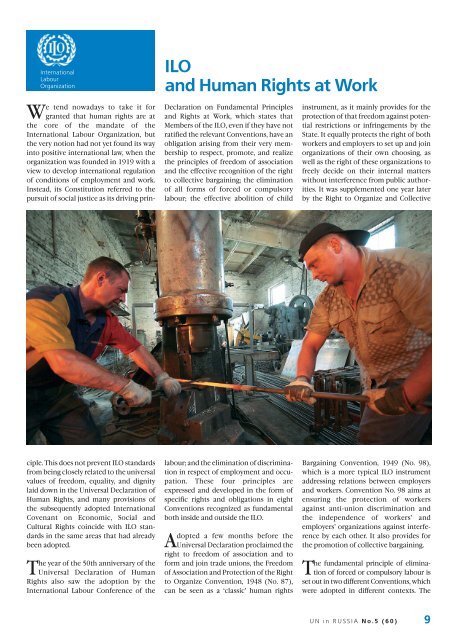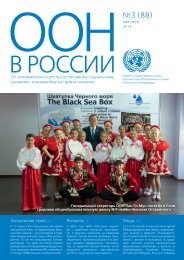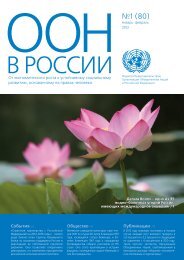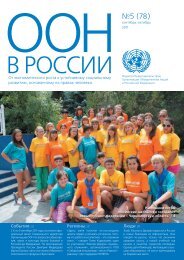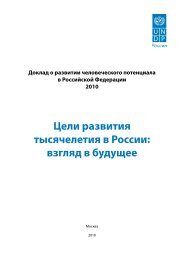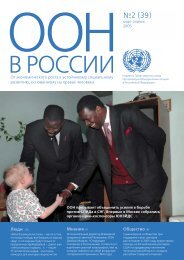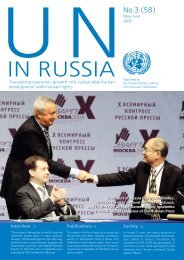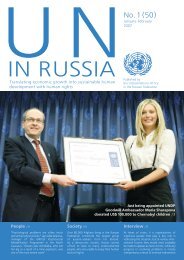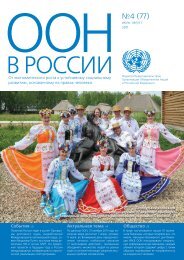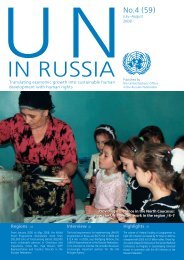Special issue 60th Anniversary of the Universal ... - UN Russia
Special issue 60th Anniversary of the Universal ... - UN Russia
Special issue 60th Anniversary of the Universal ... - UN Russia
- No tags were found...
Create successful ePaper yourself
Turn your PDF publications into a flip-book with our unique Google optimized e-Paper software.
InternationalLabourOrganizationILOand Human Rights at WorkDeclaration on Fundamental Principlesand Rights at Work, which states thatMembers <strong>of</strong> <strong>the</strong> ILO, even if <strong>the</strong>y have notratified <strong>the</strong> relevant Conventions, have anobligation arising from <strong>the</strong>ir very membershipto respect, promote, and realize<strong>the</strong> principles <strong>of</strong> freedom <strong>of</strong> associationand <strong>the</strong> effective recognition <strong>of</strong> <strong>the</strong> rightto collective bargaining; <strong>the</strong> elimination<strong>of</strong> all forms <strong>of</strong> forced or compulsorylabour; <strong>the</strong> effective abolition <strong>of</strong> childinstrument, as it mainly provides for <strong>the</strong>protection <strong>of</strong> that freedom against potentialrestrictions or infringements by <strong>the</strong>State. It equally protects <strong>the</strong> right <strong>of</strong> bothworkers and employers to set up and joinorganizations <strong>of</strong> <strong>the</strong>ir own choosing, aswell as <strong>the</strong> right <strong>of</strong> <strong>the</strong>se organizations t<strong>of</strong>reely decide on <strong>the</strong>ir internal matterswithout interference from public authorities.It was supplemented one year laterby <strong>the</strong> Right to Organize and CollectiveWe tend nowadays to take it forgranted that human rights are at<strong>the</strong> core <strong>of</strong> <strong>the</strong> mandate <strong>of</strong> <strong>the</strong>International Labour Organization, but<strong>the</strong> very notion had not yet found its wayinto positive international law, when <strong>the</strong>organization was founded in 1919 with aview to develop international regulation<strong>of</strong> conditions <strong>of</strong> employment and work.Instead, its Constitution referred to <strong>the</strong>pursuit <strong>of</strong> social justice as its driving principle.This does not prevent ILO standardsfrom being closely related to <strong>the</strong> universalvalues <strong>of</strong> freedom, equality, and dignitylaid down in <strong>the</strong> <strong>Universal</strong> Declaration <strong>of</strong>Human Rights, and many provisions <strong>of</strong><strong>the</strong> subsequently adopted InternationalCovenant on Economic, Social andCultural Rights coincide with ILO standardsin <strong>the</strong> same areas that had alreadybeen adopted.The year <strong>of</strong> <strong>the</strong> 50th anniversary <strong>of</strong> <strong>the</strong><strong>Universal</strong> Declaration <strong>of</strong> HumanRights also saw <strong>the</strong> adoption by <strong>the</strong>International Labour Conference <strong>of</strong> <strong>the</strong>labour; and <strong>the</strong> elimination <strong>of</strong> discriminationin respect <strong>of</strong> employment and occupation.These four principles areexpressed and developed in <strong>the</strong> form <strong>of</strong>specific rights and obligations in eightConventions recognized as fundamentalboth inside and outside <strong>the</strong> ILO.Adopted a few months before <strong>the</strong><strong>Universal</strong> Declaration proclaimed <strong>the</strong>right to freedom <strong>of</strong> association and t<strong>of</strong>orm and join trade unions, <strong>the</strong> Freedom<strong>of</strong> Association and Protection <strong>of</strong> <strong>the</strong> Rightto Organize Convention, 1948 (No. 87),can be seen as a ‘classic’ human rightsBargaining Convention, 1949 (No. 98),which is a more typical ILO instrumentaddressing relations between employersand workers. Convention No. 98 aims atensuring <strong>the</strong> protection <strong>of</strong> workersagainst anti-union discrimination and<strong>the</strong> independence <strong>of</strong> workers’ andemployers’ organizations against interferenceby each o<strong>the</strong>r. It also provides for<strong>the</strong> promotion <strong>of</strong> collective bargaining.The fundamental principle <strong>of</strong> elimination<strong>of</strong> forced or compulsory labour isset out in two different Conventions, whichwere adopted in different contexts. The<strong>UN</strong> in RUSSIA No.5 (60) 9


